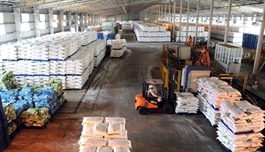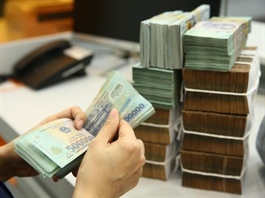Businesses hoping for flexibility with lending conditions
Businesses hoping for flexibility with lending conditions
Businesses are still up against it when it comes to applying for bank loans, even though Vietnam’s central bank has cut interest rates several times already this year.

The State Bank of Vietnam (SBV) last week further reduced a number of operating interest rates, including the refinancing interest rate from 6 to 5.5 per cent; the maximum interest rate for demand deposits with terms of less than one month from 1 to 0.5 per cent; and deposits with a term from 1-6 months, from 6 to 5.5 per cent.
Interest rates for deposits with a term of six months or more are set by credit institutions based on market supply and demand.
The SBV has now twice adjusted the operating interest rate in just two weeks. As of March 28, credit in the economy increased only 2.06 per cent compared to the end of 2022. Credit growth is low because key sectors such as exports, investment, and processing and manufacturing are declining, leading to low credit demand. Besides this, the slow disbursement of public investment capital has affected credit demand.
Trinh Thi Thuy Lan, director of Thai Duong Trading Development and Technology JSC, a medium-sized building materials enterprise in Hanoi, said that her business is still facing difficulty in accessing loans, although the company has borrowed from the bank for many years.
“At the end of 2022, the bank asked us to pay off the old debt before getting a new loan. So, I had to borrow from private sources at a higher interest rate to have money to maintain the business,” Lan said.
Pham Van Viet, chairman of Viet Thang Jean Co., Ltd., said that the biggest difficulty for textile enterprises was cash flow.
“These enterprises are stuck with both input and output inventories, due to the decrease in purchasing power in the export market and slow recovery of orders,” said Viet. “Meanwhile, they have to deal with old loans that are due. Unless they have enough money to pay debts, many businesses will move into the bad debt group and struggle to apply for new loans.”
Viet said he hoped that the SBV and commercial banks would maintain businesses in their current debt groups, and be flexible in terms of collateral and lending conditions for garment and textile enterprises.
The Ho Chi Minh City Union of Business Associations (HUBA) agreed that common difficulties being faced by businesses include a lack of cash flow and access to loans, not being allowed to disburse money, and being moved to bad debt groups.
HUBA chairman Nguyen Ngoc Hoa said, “With the current market situation, and interest rates higher than 10 per cent, many businesses will not dare to borrow for long-term investment, although they are in dire need of working capital to get through this difficult period. Therefore, it is necessary to issue a more flexible policy in lending conditions to remove difficulties in accessing capital for businesses.”
Economist Le Xuan Nghia said that with two consecutive reductions in operating interest rates, the SBV had sent a clear message about monetary policy going in a more relaxed direction. However, in the context of weak absorption of the economy, interest rates must be reduced further to stimulate credit demand.
“A confusing situation is occurring in the business community. Many exporters are eligible for loans, but they don’t need loans due to the lack of orders and high interest rates being too high. The remaining group of businesses wants to borrow despite such high interest rates, but they are not eligible for loans,” said Nghia.
Although banks offer preferential interest rate campaigns, they are not allowed to lower credit standards. So, it is still difficult for businesses to access this capital.
“Most businesses that do not have access to credit are small- and medium-sized enterprises (SMEs), newly established enterprises whose financial situation is vulnerable or not very transparent, or those that do not have collateral according to internal regulations of credit institutions,” Nghia said.
The economist added that the key current issue is to improve the capital absorption capacity of the economy, and ensuring the reduction of interest rates will be effective in helping businesses access capital.
“We need the close coordination between monetary policies, fiscal policies, and other supportive policies,” Nghia said. “We must create favourable conditions in tax policy through reducing corporate income tax, VAT, and accelerating disbursement of public investment to create spillover effects and a strong push for enterprises to recover.”
To Hoai Nam, standing vice chairman and general secretary of the Vietnam Association of Small- and medium-sized Enterprises, said that a reduction of 1-2 per cent of loan interest rates was necessary for large businesses with high-value loans. “It is more important for banks to consider viable business plans of SMEs, and then provide a funding plan suitable to the actual situation of these businesses that they can benefit from reduced rates from the SBV,” said Nam.





















